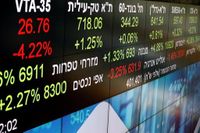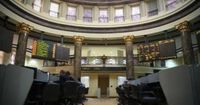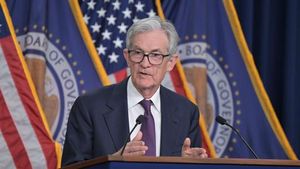Israeli Prime Minister Benjamin Netanyahu expressed hope on Sunday that U.S. President Donald Trump would lift the financial decrees imposed on Israel when they meet in Washington this week. This comes as the new comprehensive financial decrees announced by Trump impose a 17% tax on Israeli goods, leading to significant market repercussions.
On the same day, the Tel Aviv Stock Exchange saw a sharp decline of approximately 4%, largely influenced by a significant drop in Wall Street's performance the previous week. The Tel Aviv Stock Exchange opened its financial week with collective declines across all indices, reflecting concerns over Trump’s announcement of broad U.S. decrees affecting over 90 countries, including Israel.
The Tel Aviv 35 index fell by 3.6%, while the Tel Aviv 125 index lost about 3.9%. The banking sector index also decreased by 3.85%. These declines occurred at a critical time, as over 40 local companies, primarily in the real estate sector, were preparing for initial public offerings (IPOs) in the local market during May.
On April 1, 2025, the companies Yeshpro and Tenofort announced the postponement of issuing bonds worth 850 million shekels (approximately $229 million) as part of a merger deal between the two firms. Yeshpro is a leading company in developing and managing commercial centers in Israel, while Tenofort specializes in real estate development for commercial and logistics complexes.
Concerns about disturbances in both global and local financial markets, coupled with a 0.3% rise in government bond yields, prompted the two companies to delay their bond issuance, reflecting the current investment environment's reluctance even among the largest players in the real estate sector.
The anticipated wave of IPOs, which included over 40 companies, was now in jeopardy. One of the main IPO managers remarked that real estate companies represented a crucial part of these upcoming offerings. However, after a 20% decline in the sector's shares over two weeks, the downturn in the U.S. market was a devastating blow to their plans.
He added that while larger companies might stick to their plans, medium and small companies would struggle to raise funds at the valuations they had hoped for. Many would likely have to postpone their offerings or shift to bond issuance instead.
Some notable real estate companies on the verge of going public included Rami Levy for Real Estate, which sought an offering of 3.5 billion shekels ($946 million) but decided to postpone until August. Amfa for Real Estate, owned by the Nachshoni family and Shlomi Fogel, had similar ambitions.
Shlomo for Compounds, in partnership with Jared Kushner, was targeting an offering of 4.5 to 5 billion shekels ($1.21 to $1.35 billion). Other companies, like Reisdor and Gabay Real Estate Group, were also planning significant public offerings.
However, the market was in a state of panic, with a lack of appetite for purchasing securities. An IPO expert conveyed that the sentiment had shifted dramatically, with managers now focused on what to sell rather than what to buy.
Metan Shtrit, chief economist at Phoenix, noted that the combination of Trump’s actions and international reactions had raised fears of stagflation in the markets. He pointed out that the decline in oil and commodity prices globally, by up to 12%, along with decreasing import prices, might lead to a proportional drop in tax revenues. They were adjusting their inflation forecasts for April down to 0.2% and for the following year to 2.4%.
On April 3, Trump announced a 17% customs duty on Israeli imports to the United States, which coincided with his earlier decision to reduce tariffs on American products to zero in an attempt to mitigate economic losses.
A report from Calcalist highlighted that investment companies were highly exposed to significant risks in the event of a global recession. A source mentioned that if the recession persisted, the quality of credit would deteriorate, leading to increased defaults. Foreign investments were becoming riskier, prompting many entities to call for a halt to ongoing financial activities.
Interestingly, among all sectors, military industries appeared to be the only ones poised for survival. Specifically, the company Blisson Sasa was planning a public offering later in the year, valued at one billion shekels ($270 million). A market source indicated that if the crisis did not escalate further, the company had a good chance of proceeding with its offering.
As the trading week concluded amid a global downturn and declining investor confidence, sources from Calcalist emphasized that if the decline continued, the number of IPOs would fall drastically from the expected ten to only a few companies willing to enter the market.
In summary, the repercussions of U.S. customs duties, combined with the fragility of the global economy, have led to a near-paralysis of the Israeli offerings sector, signaling a potential broader funding crisis in the latter half of 2025.
Meanwhile, the Arab stock exchanges also faced turmoil in the first trading session following the Eid al-Fitr holiday, heavily influenced by the global market downturn. President Trump's announcement of a 10% tariff on all imports to the U.S. impacted markets across the region.
In Saudi Arabia, the largest Arab stock market, the main index plummeted by 805 points, a decrease of 6.78%, closing at 11,077 points. Trading values reached 8.4 billion riyals, with over 450 million shares traded. All shares in the Saudi Stock Exchange, with one exception, declined.
Similarly, stock exchanges in Kuwait, Oman, Qatar, and Bahrain also suffered declines, following the global market's performance. In Kuwait, the main market index fell by 5.69%, while the general index decreased by 5.16%.
The Qatari Stock Exchange saw its main index drop by 4.23%, losing 432 points in the first trading session after Eid al-Fitr, with trading volumes decreasing significantly. The Muscat Stock Exchange's main index fell by 2.62%, while the Bahrain Stock Exchange declined by 1%.
In Egypt, the stock market also experienced a downturn, primarily due to selling pressure from local investors, although Arab and foreign transactions leaned towards buying. The market capitalization lost 73 billion pounds, closing at 2.167 trillion pounds.
The total trading volume on shares reached 1.3 billion financial papers, valued at 3.6 billion pounds, with 216 companies involved in 125.8 thousand transactions. Egyptian transactions accounted for 93.91% of total trading, while foreign and Arab transactions represented 1.33% and 4.76%, respectively.
The EGX 30 index fell by 3.34% to close at 30,639 points, while the EGX 30 capped index decreased by 3.66%. The index of small and medium-sized companies also faced a decline of 4.84%.
Despite the overall downturn, eight companies saw their shares rise, including Alexandria for Mineral Oils and Wadi Al-Alamia for Investment and Development, while 181 companies experienced declines, notably Alexandria National for Financial Investments and Sinai Cement. The current market conditions reflect a challenging environment for investors across the Arab region.





